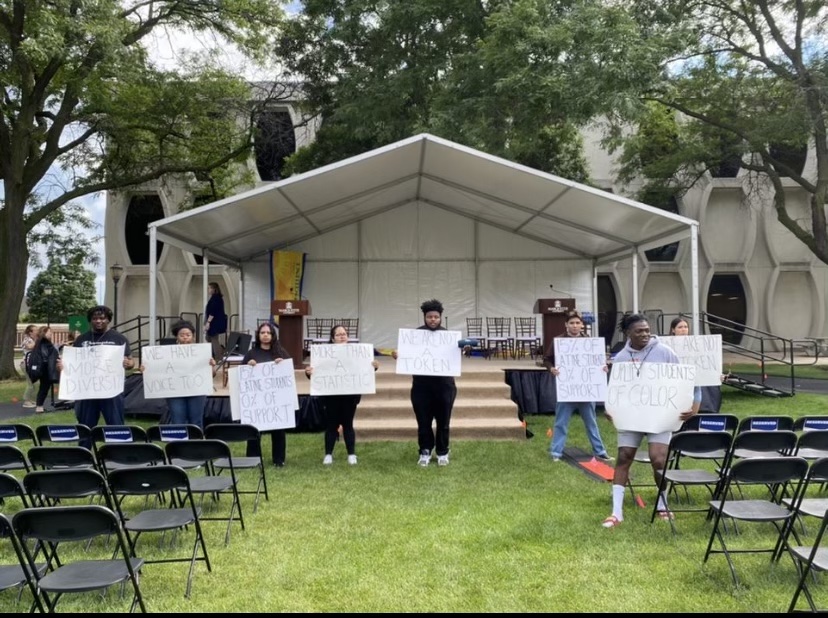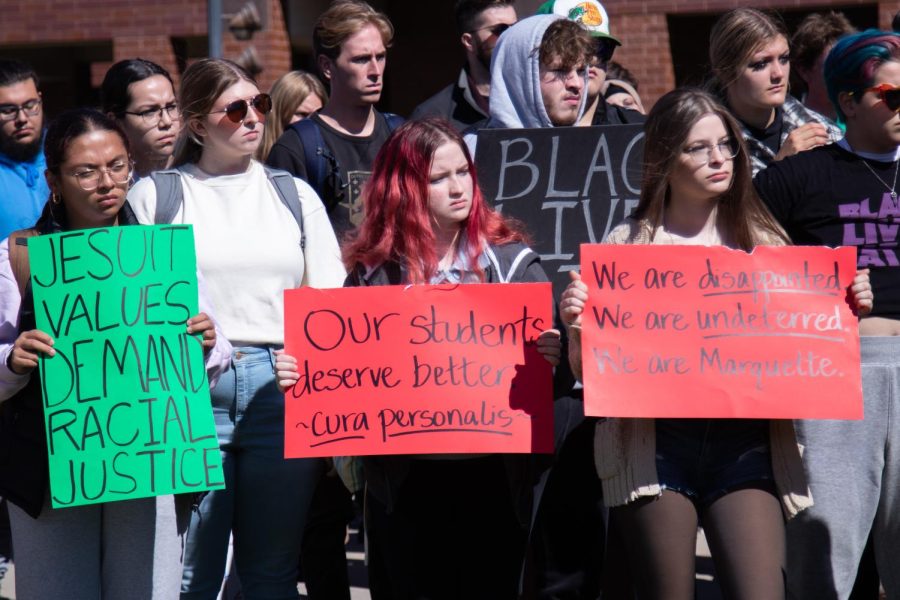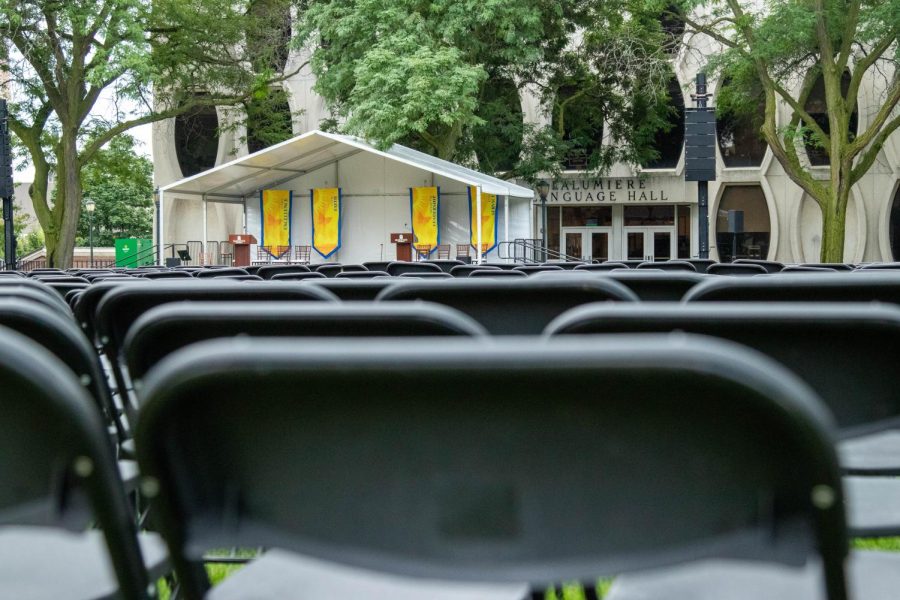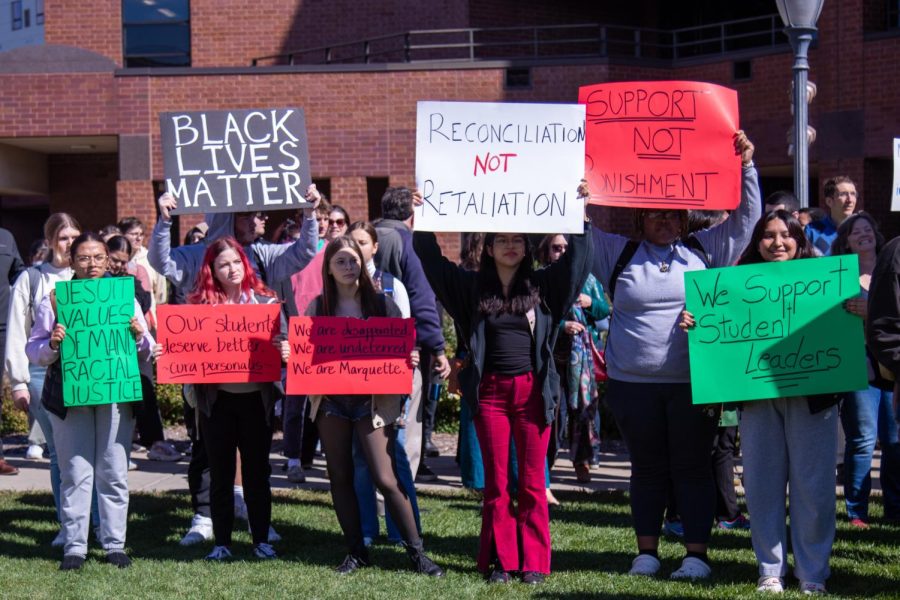Nearly eight months after the original new student convocation Aug. 25 2022, some of those who participated in the demonstration are still affected by the aftermath.
Nearly 15 minutes before the convocation started, ten students holding signs walked in front of the stage demonstrating in an effort to hold Marquette accountable for how students of color are treated on campus and by administration. The students eventually made their way to the stage, still staying silent, but started chanting later into the demonstration.
Their demonstration resulted in all of the students being sent through the student code of conduct process because they violated Marquette’s demonstration policy.
Eventually, Marquette ended up postponing the event due to the demonstrators’ “disruptive nature.”
The student conduct process responds to violations of the standards of conduct. Students are sent a letter specifying the charges as well as a date, time and location for a student conduct hearing.
The demonstrators’ original punishment was a $300 fine, a written apology letter, 20 hours of community service and to write an educational program on the demonstration policy. On top of that, all were placed on probation which forced student leaders to step down from their positions.
Two of the participants of the demonstration were the first all-Black ticket in Marquette University Student Government history: Bridgeman Flowers, a junior in the College of Education and former president of MUSG and Samari Price, a senior in the College of Arts & Sciences and former executive vice-president of MUSG. Both were forced to step down from their positions as a result of being placed on probation.
Flowers said the entire conduct process lasted from September until around the end of October.
Despite being on stage for about an hour, Flowers said he never have imagined that the effects of his actions would still impact him months later. He said the demonstration became bigger than anything he thought it was ever going to be.
“Your one little situation can impact an entire university of thousands and thousands of people. I just feel like that really grounded power but also you never realize how impactful you can be until you’re in that situation,” Flowers said.
When the demonstrators decided to go on the stage, Price said it was just a bunch of students who were tired and wanted to better the experiences of people of color on Marquette’s campus.
“Every institution that you can think of there’s always going to be some underlying flaw of it. I feel like as students of color, it’s always hard to find people that can get our input on stuff but also advocate for us when we aren’t in those spaces. And because of a lot of the vacancies that Marquette has makes it hard for people to advocate for us the way that we need them to,” Price said.
Another student who demonstrated, Teresa Godinez, a junior in the College of Arts & Sciences, also didn’t expect the situation to go as far as it did and found that it was difficult to navigate campus post-convocation. She said it was difficult to stay in an environment where she didn’t feel wanted in the first place.
“The question always comes up, ‘Are you proud to be at Marquette?’ and I found that question to be very hard whenever people would ask,” Godinez said. “Is Marquette proud to have me? Is Marquette proud to have us? And at that moment, and just all the aftermath of going through conduct and stuff, it definitely didn’t feel that way.”
At the end of the day, Godinez said the demonstration was them being student leaders and sticking up for what they thought was right. Godinez said that within itself is empowering— sticking to their own morals and values and standing their ground.
Nadxely Sanchez, a senior in the College of Arts & Sciences, said when she and the others were at the demonstration, she hoped administration would want to have a conversation about their frustrations. She didn’t expect them to be sent through the code of conduct process.
“Convocation … just for the duration that it was, I didn’t see that the response that we got [from the university] was equivalent to what happened,” Sanchez said.
Sanchez said she suffered a panic attack during her conduct hearing, which administration dismissed until her advisor spoke up.
Each student going through the hearing process is allowed to bring an advisor. The student must alert either the hearing officer or the Student Conduct Board chair in writing at least two days prior to the hearing. An advisor could be a staff or faculty member, friend, family member or resident assistant.
Now, Sanchez said she is scared to go to the Alumni Memorial Union and other areas on campus. She said there’s a lot of setbacks the conduct process has created because she’s scared the university will extend her probation or do something above probation, like expulsion— which she is held to until after graduation.
Compared to the duration Godinez was on the stage to the length of her conduct hearing, she said it was much longer.
“It was intended to be an educational process, yet it felt very dehumanizing, treating us like criminals, treating us like we did something horrible,” Godinez said. “I wish no student of color to ever go through those hearings the way that we did. Just the emotional distress that I felt before the conduct hearing, after … and waiting for the news was a different type of anxiety.”
Ultimately, Godinez said she was very careful disclosing information to other students because she feared retaliation from the university.
Flowers said probation will last until May 26 and started the day the ten of them received their conduct letter.
Flowers also said the students all received different punishments. Flowers and Price received suspension abeyance, meaning if they do anything against the rules before probation ends, they would be suspended for an entire year. Suspension would mean having to withdraw from classes and not being able to apply for classes for the following semester.
“It’s also even weirder because the punishment that we got [Flowers and Price] they said was designed for people who commit drug violations and alcohol violations, so to equate what we did to that,” Flowers said. “They say it’s for people who committed it repetitively … but this is the first time we’ve ever been on conduct and this is the punishment they gave us.”
Kevin Conway, university spokesperson, said Marquette University cannot comment on the student code of conduct process, as it is confidential.
Although Godinez and Price were charged with the same thing, Godinez said she doesn’t have ‘suspension with abeyance’ on her report so she questions what was different.
Flowers and Price said the difference in punishments wasn’t the only thing weird about the conduct process. Flowers also said how administration decided to split them up for the hearing was confusing.
“All the Latinx students went on the same day. Some of them went together, but the Black students went back-to-back on different days,” Price said. “It was to the point where me and one of my peers, we could’ve went together, because … mine was first, his was next, but mine went so much over that it infringed on his.”
Flowers said when they decided to appeal the conduct decisions, only one of the consequences was rescinded: the $300 fine.
“We still don’t understand what happened,” Sanchez said. “Even this semester I’m learning new details I didn’t know and that makes me question the whole process and the thing is too we were all kind of charged with the same thing but there was different levels of punishment.”
Price said they also asked for a more restorative justice approach that was dismissed in their appeals, despite having the Center for Peacemaking and other diversity and inclusion committees supporting them.
“I just questioned like ‘Well what are we doing with those committees? What are we doing with those resources that we’re able to have Black and brown students put on probation for a year,’ and Black students being put on [suspension] with abeyance, even though we all did the exact same act but some got punished harsher than others,” Price said.
To process the conduct procedure, Sanchez said she has started long-term therapy and found safe spaces on campus, such as campus ministry, but staying off campus has also been helpful.
“When I can, I go to a coffee shop or somewhere that’s not campus. When I have to be here, I have to be here for class, I can’t skip that. But just avoiding Marquette to be honest helps on my end,” Sanchez said.
Flowers responded to Sanchez saying it’s upsetting she feels like she has to avoid Marquette despite paying hundreds of thousands of dollars to get an “equal education.”
Flowers said he has also had to start going to counseling. He said the only people who reached out to check in on him were people of color.
“Even though you might not support what I did or what we did we’re still students at the same time and reaching out to us is doing your job in some sense too,” Flowers said. “I think the lack of that really showed the priorities of the university and certain staff members so that really felt disheartening on my end.”
The administration and staff who walked with them to turn in their appeals helped Flowers work through this time. Flowers said his peers also helped pick each other up but it was also disheartening since they needed to save each other.
“I think based off of the university they’ve learned from this. I think that we’re all still in the process of trying to do that too and learn that the purpose behind it because in reality it didn’t really bring any growth. It just brought more trauma in our lives and it made it where we don’t really have that many resources on campus, so I’m still trying to figure out the part— the larger process that came with it,” Flowers said.
Price said places that were supposed to be “safe spaces” for her, such as the center for engagement and inclusion, were not a comfortable environment post-convocation. She said last semester was one of the most difficult semesters she’s had, and she didn’t know if she wanted to finish.
“If I’m going to be completely honest, nobody from that space [the CEI] reached out to ask if I was okay. None of the administrators there asked if we were okay in fact some of them do not look me in my face when they see me on campus, they turn the other way,” Price said.
However, Price said she’s thankful for the faculty and staff on campus that supported her and the rest of the students by bringing in health-clinicians to talk to them and staying after hours to talk.
Godinez said the professors that helped them showed her what it means to be a true educator. She said the main challenge through the conduct process was balancing being a student as well as the emotional trauma she faced.
Godinez said she had even looked at transferring schools and realized that she couldn’t transfer to some universities while on probation or other disciplinary action.
“They basically want you to finish your sentence,” Godinez said. “It sounds really bad, but you can’t do a lot of stuff when you’re facing disciplinary actions.”
Sanchez wonders if things would’ve been different if she went to a school other than Marquette. She also wonders if she would have had a different experience, been a different person or held the trauma that she does today. She said there’s so many “what if’s.”
“When I started my senior year, I was like, ‘I’m gonna have fun, I’m gonna relax with my friends.’ Like, you know, what you see on social media with those white students, I’m gonna go to the block party, I’m gonna go to the bars, because I’m finally of age. I want to have fun. I want to have that traditional senior year. Marquette really said no,” Sanchez said.
Aside from the other nine students involved Godinez said nobody else understood going through the conduct process, so they all relied on each other.
“I would have hoped that we would have bonded through the great things that we had planned and set in our roles in MUSG [with Flowers and Price], but instead we bonded through the trauma that we all went through with this. But at the end of the day, it brought me closer to you two [Flowers and Price] and each and every one of those nine students,” Godinez said.
Leading up to the demonstration, Flowers said although there were many different issues that led them to demonstrate, the biggest was the racism on campus. Flowers said an inspiration to get on the stage was the Black Lives Matter movement. He said if people were going up against the world, he can go up against his university.
Being part of the first all-Black MUSG ticket in Marquette history, Flowers said regardless of that title— he is still going to be an advocate.
“I’m still that person, I am still that student,” Flowers said. “I still come from a long line of people who did not want to just shut up and sit down. So being that, we stepped out and we did what we had to do and we got our punishment and we did it gracefully.”
Whenever people ask Godinez why she focuses on problems, she questions why aren’t they seeing them.
“What is that disconnect that is not allowing you to see the issues that I’m seeing because I can’t be the only one to carry that responsibility or feel like I’m the one that’s an instigator for wanting to create these problems, because these problems are very much crystal clear in front of you yet many of our peers don’t see it,” Godinez said.
Flowers said since the demonstration occurred in front of first-year students and their families, he fears this process that the demonstrators endured will deter the first-year class from speaking out.
The conduct process, Flowers said, sets that precedent of fear. He said as a leader who will be at Marquette for another year, he wants to be able to tell people to use their power, but also be more conscious than they were to avoid the same consequences.
However, Flowers said he hopes he sends the message that through it all, the ten of them are still alive, breathing, moving and people at the end of the day. Moving forward, Flowers said, shows the power they hold and that they are all going to grow as phenomenal people in the future.
To Flowers, he hopes this will not be the last time Marquette hears his name. Although he said it will be the last time they hear his name attached to probation, he still wants to rebuild the student organizations that are often overlooked.
“Something I’m starting to tell people is to turn our stories into actions. We’re not just going to go through what we went through and make it as that— make that your power, to go into action and push forward and become something that’s bigger than yourself. Don’t do it in the way that we did it because you saw the reaction— do it in your own way,” Flowers said.
Agreeing with Flowers, Godinez said future generations of students of color seeing the ten of them get punished probably instilled a lot of fear.
“In the sense that if I speak up will I get punished? If I speak up what will happen? And I think the biggest advice to give them is don’t let fear stop you, don’t let those tactics that they like to use fear you. Make your voice feel like it can be heard, you can stand up for what you think is right,” Godinez said.
Godinez said she wants students of color to know that they deserve to be at Marquette and that there are spaces for them on this campus. She said she is the leader she is not because of Marquette, but despite it.
Price said she was part of the convocation demonstration to be an inspiration to get involved on campus and carry on the legacy of the initiatives they have been promoting. Even though she is graduating this May, she said she wants to see some of the work she has been involved with continue after she leaves.
“This did not stop my voice at all, in fact it kind of made it worse but it taught me how to reclaim my power and my voice as a Black woman because I was the only one on that stage that day,” Price said.
Sanchez hopes that students will continue to speak up, even through smaller levels such as conversations.
“There’s always going to be that aspect of students speaking up and speaking their truth,” Sanchez said. “There’s going to be generations of Marquette students that might even be stronger than us, who knows.”
To Sanchez, the entire situation has shown her that she is more capable than what she previously thought despite being a woman, being a first-generation student, being low-income and being Latina. She said she’s realized that she’s powerful and her voice matters.
“When the May 26 day comes and everything is cleared, we still are going to hold this. This is now a lifelong attachment that we’re going to always have and always be triggered by it … If we’re going to hold it- you’re going to hold it. This is a two-way street, It’s your trauma now too… we experienced it and so did this campus along with us,” Flowers said.
Skyler Chun contributed to this report.
This story was written by Julia Abuzzahab. She can be reached at [email protected]









